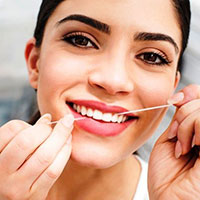 Do you floss on a daily basis? If your answer is an emphatic “no,” you’re not alone.
Do you floss on a daily basis? If your answer is an emphatic “no,” you’re not alone.
It’s been estimated that around 36% of Americans would rather clean their toilet than floss their teeth. What’s the reason for people’s resistance to moving a waxed piece of string between their teeth to remove stuck food particles?
Nobody knows for sure. It could be that our go-go-go lifestyle has led us to view flossing as a waste of time – after all, we just finished brushing our teeth, shouldn’t that count for something?
Complicating matters further, the Dietary Guidelines for Americans set forth by the US Department of Agriculture (USDA) has removed flossing as a guideline for good oral health.
So, case closed, no need to floss anymore because the USDA told us so?
Not exactly.
What Does Flossing Prevent?
Many dental experts don’t share the same viewpoints as the USDA when it comes to flossing your teeth daily. Flossing can help prevent gum disease, and over 12 studies have found that people who floss on a daily basis were less likely to suffer from bleeding gums.
Those same people were found to have lower overall levels of gum inflammation (aka “gingivitis”). No matter what the USDA claims, food particles that remain lodged in-between teeth can and will cause gum inflammation and tooth decay.
Why is Flossing a Good Idea?
There’s an old saying that carpenters and other tradesmen have:
“The right tool for the job.”
If a carpenter needs a screwdriver to turn a screw, he’s not going to reach for the hammer inside his toolbox. He’s going to select the screwdriver that will best be able to turn the screw to complete the job.
The same goes for brushing your teeth. Think of your toothbrush as a tool. Its job is to remove loose food particles and other gunk and debris after you eat. It also helps remove plaque.
The problem with toothbrushes is that they can’t reach the food that’s stuck in-between the small natural gaps in your teeth. This is where dental floss comes into play. By flossing after every meal, you will be removing food particles that are too small for you to feel with your tongue (and instinctively reach for a toothpick).
How to Properly Floss?
Believe it or not, there is a recommended technique for flossing. It will not only help save time and energy but allow you to be more efficient in removing food particles that are stuck between the teeth.
1. Start with around 18 inches of dental floss. Wind most of it around your two middle fingers, leaving two inches of floss in the middle.
2. Using your thumbs and middle fingers, hold the floss tightly and slide up and down and in-between your teeth.
3. Curve around down to the bottom of each tooth and gently go beneath the gum line. This is one place that a toothbrush or mouthwash can’t reach.
4. As you move from tooth to tooth, be sure to unwind a bit of new dental floss from one hand to ensure maximum efficiency.
Alternatives to Flossing
Ok, so what if you really, really, really don’t like flossing – but reading this article makes you a bit concerned for your oral health? There are flossing alternatives on the market that could potentially help.
Water Piks – There is a debate amongst medical professionals as to whether or not water piks are a viable alternative to actual flossing. They perform the same primary function, but instead of a wax piece of a string, a gentle jet of water is sprayed into your mouth to remove any loose food.
Floss Picks – Floss picks are great for when you don’t want to hassle with a long string of dental floss. They are made out of a small piece of plastic that has one inch of dental floss attached to it. It has a handle on one end, and that makes it very easy to use.
Soft-Picks – These are relatively new. They offer a gentler flossing experience, which is good for older people and those who have braces. You can find them online or in any grocery or home goods store.
What Can Happen if You Don’t Floss?
Have you ever gone to the dentist and wondered why they recommend a thorough teeth cleaning? It’s because you’re not flossing regularly. Over time, tartar can build up, and only your dentist will be able to remove it with professional teeth cleaning.
You can have bad breath from minuscule particles of food rotting away in your mouth which can ultimately lead to tooth discoloration and gum disease.
Flossing shouldn’t take more than a few minutes after every meal. By doing a bit of preventative maintenance on a daily basis, you can protect your health as well as the health of your teeth.
Teeth Cleaning in Chicago
If you don’t floss as often as you should, you should get a professional teeth cleaning which will not only leave your mouth feeling fresh and clean, but help prevent tooth decay and other oral health issues.
At Water Tower Dental Care, we specialize in helping our patient’s smiles look and feel like a million bucks!






 Website Powered by Sesame 24-7™
Website Powered by Sesame 24-7™